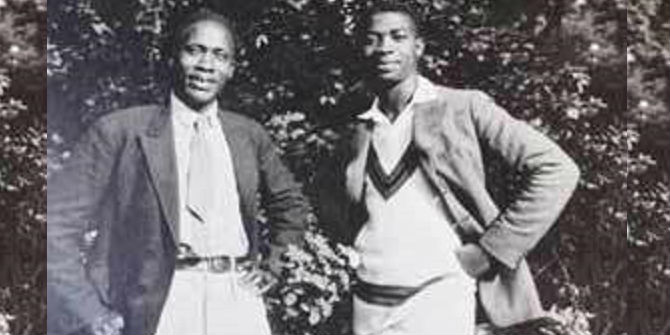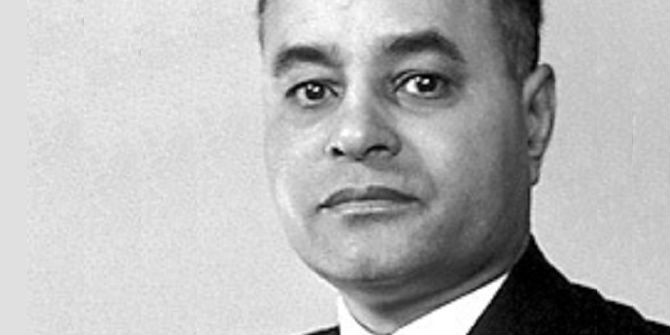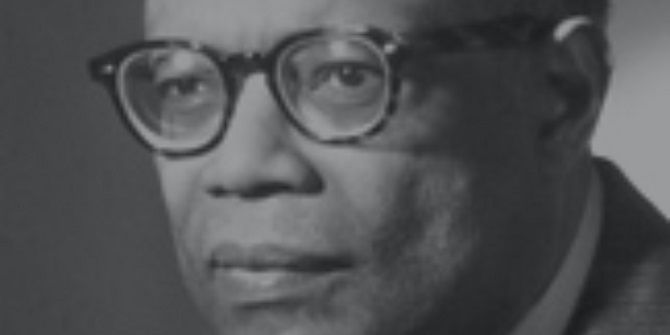Henry Louis Gates, Jr became an LSE Honorary Graduate in 2023. To accept his honorary award, he delivered these opening remarks to an audience in the Shaw Library, before speaking at a public event.
“Why has LSE long held a special place in my imagination? It all started when I was a sophomore at Yale, and was assigned Jomo Kenyatta’s classic work of anthropology, Facing Mount Kenya. Kenyatta, then an anticolonial activist, went on to become the first President of Kenya in 1964.
I was astonished to learn that a head of state in Africa had actually written and published an academic work of anthropological scholarship that had emerged from work he had done with influential Polish-British anthropologist Bronislaw Malinowski at the London School of Economics, culminating in a postgraduate diploma in anthropology; Malinowski, in fact, had written the book’s introduction, exuberantly exclaiming, not without some unintended irony, that Kenyatta’s book:
“…will thus be useful, inspiring, as well as entertaining and instructive, in a variety of ways and for a multitude of readers. [Because] It is one of the first really competent and instructive contributions to African ethnography by a scholar of pure African parentage. Through his upbringing Mr Kenyatta combines to an unusual extent the knowledge of Western ways and Western modes of thought with training and outlook essentially African. As a first-hand account of a representative African culture, as an invaluable document in the principles underlying culture-contact and change; last, not least, as a person statement of the new outlook of a progressive African, this book will rank as a pioneering achievement of outstanding merit.”
Quite an endorsement from one’s professor, I have to say, but also a fascinating, if unwitting, revelation of the essentialism that informed even the intimate, scholarly interactions between the British professor and his Kenyan student: Malinowski’s belief in the “essentially African” as opposed to what he firmly believed to be “Western ways and Western modes of thought.”
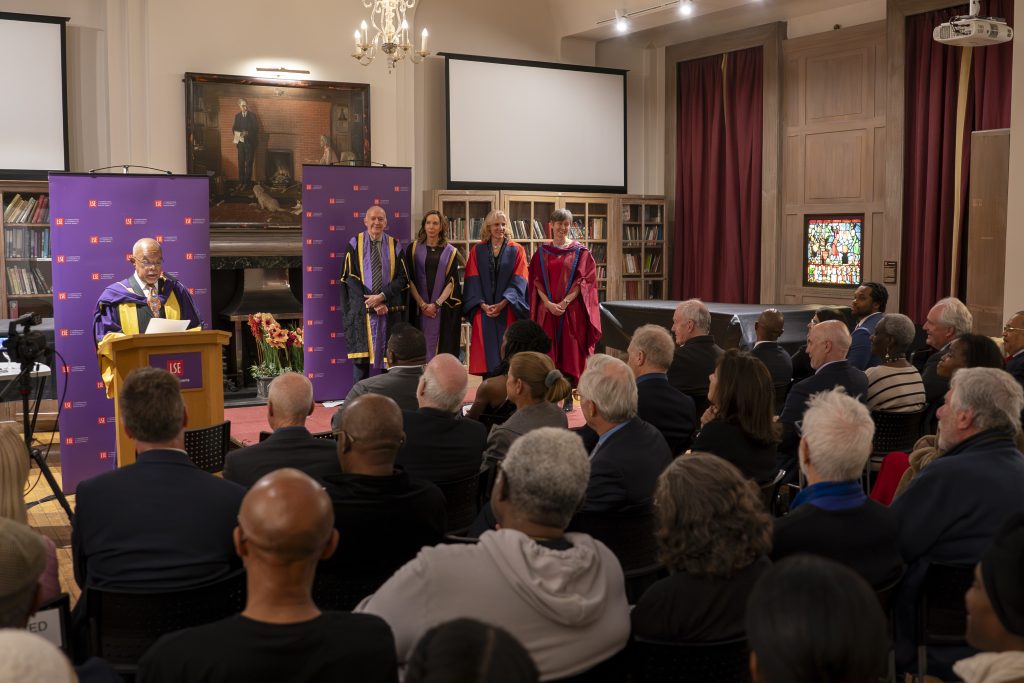
Nevertheless, reading Kenyatta’s fascinating book led me to the discovery that he was part of a circle of brilliant black intellectuals in London at the time, that included his best friend and mentor, George Padmore.
Padmore himself was a writer and a socialist – he had served as best man at the Ghanaian lawyer and politician Joe Appiah and Peggy Cripps’ controversial interracial wedding; Appiah married Cripps, the daughter of Sir Stafford Cripps, while he was studying Law in London. (Their son is the brilliant philosopher, Kwame Anthony Appiah.).
Padmore, who had become a Communist during his college education in the United States, had by then been alienated by Stalinism but remained a dedicated socialist, and came to London in 1934 where his childhood friend, the great Trinidadian author and intellectual C L R James was already living. In 1935, C L R James and Padmore formed the International African Friends of Abyssinia, soon after Italy invaded that country, with Kenyatta becoming the organisation’s secretary.
Also among this exhilarating swirl of black intellect were the following:
Paul Robeson
The star Paul Robeson had come to London first in 1928 to star in the West End premiere of Show Boat. He had been Phi Beta Kappa at Rutgers and had graduated from Columbia Law School in 1923. He enrolled in SOAS in 1934 to study Swahili and phonetics, and wrote the seminal essay, “I want to be an African” while living in London (in it, he wrote, “Meanwhile in my music, my plays, my films, I want to carry always this central idea: to be African. Multitudes of men have died for less worthy ideals; it is even eminently worth living for”), and even more fascinating, two essays that he published in The Spectator in 1934, presumably under the spell of Malinowski, in one of which (“The Culture of the Negro”) he articulated the key concept of the Négritude movement unfolding over in Paris at the same time:
“The white man has made a fetish of intellect and worships the God of thought; the negro feels rather than thinks, experiences emotions directly rather than interprets them by roundabout and devious abstractions, and apprehends the outside world by means of intuitive perception instead of through a carefully built up system of logical analysis.”
Eslanda Robeson
Robeson’s wife, Eslanda Robeson, was enrolled at LSE between 1933 and 1935 and then again in 1937 to 1938, and was an anthropologist, writer and activist in her own right. Essie, “Eslanda Goode Robeson,” Marc Matera tells us, “audited the seminars of Firth and Malinowski in 1934, where she met [Nathaniel] Fadipe and Kenyatta. Kenyatta also worked intermittently as a translator for Malinowski, the institute, and Ida Ward at the School of Oriental and African Studies, where he interacted with the African American linguist Lorenzo Turner and Paul Robeson. With Malinowski’s assistance, Kenyatta and Fadipe received grants from the institute to support their research on the Kikuyu and Yorùbá, respectively…”
Ralph Bunche
The political scientist, professor and diplomat Ralph Bunche arrived in 1937, three years after taking his PhD in Political Science at Harvard, becoming the very first black person to take that degree. Not only did Bunche attend Malinowski’s seminars; he studied Swahili under Kenyatta.
Arthur Lewis
Also studying full-time at LSE at this time was a very young William Arthur Lewis, from St Lucia, who graduated with honors in 1937, earned his PhD in Economics here in 1940, and became the very first black faculty member at LSE.
Both Bunche and Sir Arthur Lewis would be awarded Nobel Prizes, the first for Peace, the other for Economics.
In other words, if you wanted to be on the cutting edge of Pan-African cultural studies, African anthropology, and decolonisation political activity, London was the place to be, and LSE was at the heart of it. And all of this I learned because we were assigned Facing Mount Kenya in an undergraduate course at Yale.
I used to try to imagine what it must have been like to be there at that time, to be part of the magic generated within this circle of scrutiny of the African past and optimism about the continent’s future centred around LSE. How I envied them!
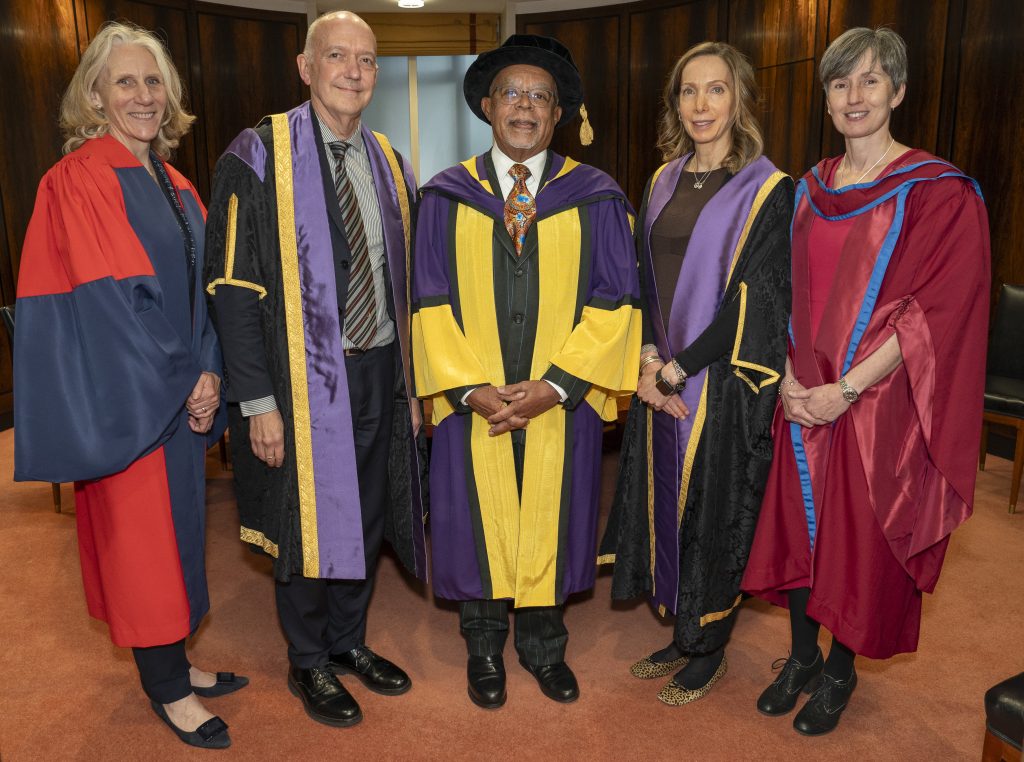
Looking back, I believe that this was the source of my dream of assembling, nearly a century later, a similar group of scholars and public intellectuals in an academic department whose work would focus on what my friend and former LSE professor, Paul Gilroy, brilliantly named “The Black Atlantic,” as well as on the Black world more broadly, from the continent to Europe and through the Caribbean, Afro-Latin America, and Black America, of course.
This also may have been the source of my dream of studying abroad in England, following graduation from Yale. When the kids I was growing up with were dreaming about being professional athletes, like Hank Aaron and Willie Mays, I was fantasising about being a Rhodes Scholar. And it was at Cambridge that the cultural theorist Raymond Williams introduced me to the work of someone named Stuart Hall, though oddly never bothered to tell me that Stuart, like me, was a black man studying in England and hailing from elsewhere. Stuart’s work, of course, would become the staging ground of Black British Cultural Studies, to which all of us working in literature, art, music, and film, on my side of the Atlantic, owe an enormous debt.
This then brings me to the aesthetic of the person who is about to join me on stage for a conversation, Sir Isaac Julien. One of the many things that I love about Isaac’s work is his focus on the archive.
During a call last Thursday with Sophia D’Angelico, who has been so fabulous to work with in preparation for this event, Isaac and I concurred that despite the sometimes dazzling work unfolding in the field of “critical fabulation,” nevertheless, “there was still gold in the archives.” And I want to end my remarks with a brief reflection on the importance of excavating the archives.
One of the interventions that most excites me is the completion of some major archival projects that are revolutionising, each in its own way, our knowledge of the history of race, the history of art, and the history of slavery, more particularly.
I believe these projects, directly facilitated by the revolution in digitisation, will be among this generation’s most lasting contributions to scholarship, and to combatting racism more generally. The mixed blessing—for some, the curse—of African and African American Studies is that we often have to resurrect the tradition before we can even begin to explicate it. And for some, that sort of work is dull, dry, and laborious, while for some others, it is a labour of love. So I’m hoping that, in this time of grand theory, renewed energy will be directed toward the archive.
I want to mention, briefly, one extremely important and innovative archival project, which I believe have enormous implications that we are only just beginning to understand: the Centre for the Study of the Legacies of British Slavery, founded and directed by Professor Catherine Hall. Its online “Encyclopaedia of British Slave Ownership” is “a more or less complete census of slave-ownership in the British Empire in the 1830s, at the time slavery was abolished in 1833…and £20 million awarded in reparations, not to the enslaved, of course, but to the slave-owners.” Catherine, this is a project of great vision, with profound implications, for our understanding of the costs and benefits of the institution of slavery, benefits, and costs, still accruing today, and I applaud you for undertaking the task and completing it so well.
There are volumes of PhD dissertations in this project alone, as well as in the “Image of the Black in Western Art” archive project that I have had the pleasure of editing with the great art historian, David Bindman, and the astonishingly detailed “Trans-Atlantic Slave Trade Database,” created by David Eltis and David Richardson.
These two projects bear great promise for potentially influencing our understanding of the history of racism and actual real-world, social policy, and it is my hope that the work we do at the Hutchins Center at Harvard can engender more and more of these large-scale digital data projects.
Stuart Hall famously said that “Race is the modality in which class is lived, the medium in which class relations are experienced.” This is the nexus in which so much of the work I have tried to do is embedded. As the head of a research centre, I have tried to foster an atmosphere of scholarly collegiality, not nearly as exciting, I’m sure, as that created by Malinowski here at LSE, but nonetheless a place, a safe-space, where thoughtful people can pursue thoughtful work to their own logical conclusions in a space as far removed from ideological bullying and political correctness as possible.
Not to undertake work that is removed from the world, but work that can possibly be drawn upon to help change the world, precisely when, in my own country, the democratic institutions that we so cherish, at least in theory, and the freedom of academic inquiry, in practice, face daunting challenges that many of us thought had been long-resolved.
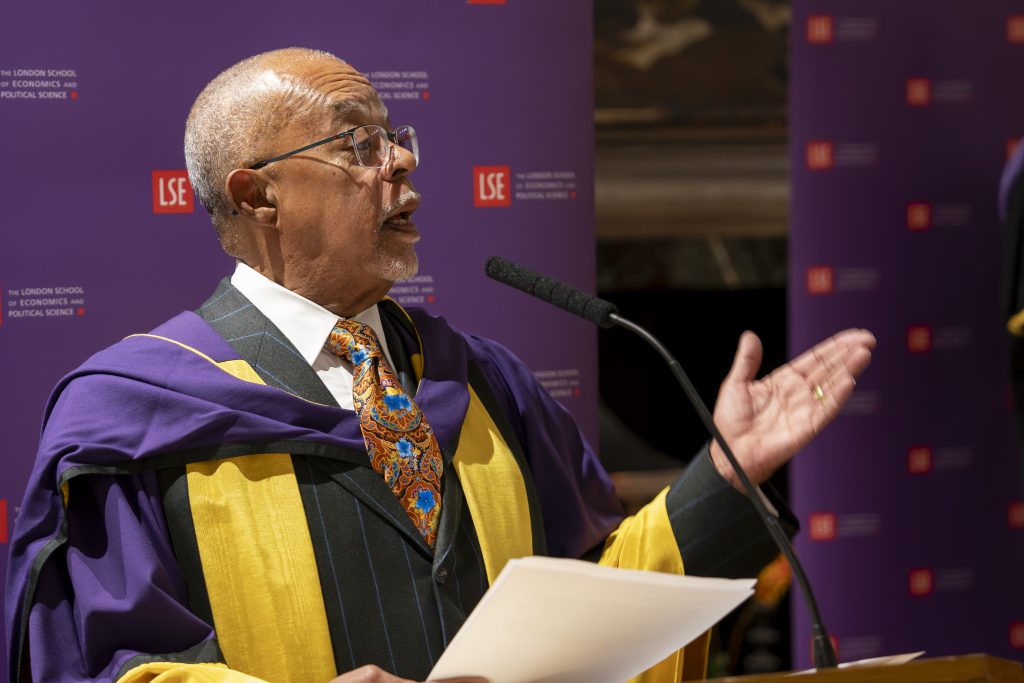
I’ve just come to England from the inauguration of Harvard’s first Black President, Claudine Gay, a first-generation descendant of Haitian immigrants and a scholar of African American Studies. Claudine’s appointment as President calls to mind another “black first,” the election, in 2008, of course, of the first Black President of the United States.
So many of us thought a new day had truly dawned with Barack Obama’s election, leading even some of the most sober scholars, drunk on exuberance, to declare that a black man in the Oval Office was an augury of “the end of race,” which implied the end of racism.
Boy, were they wrong! Instead, in retrospect, it seems that the election of the first Black President roused the slumbering beast of white supremacy, now wide awake, nakedly visible among us, and threatening both black political rights and the academic principles of freedom of speech and open inquiry that we hold so dear.
Can it be accidental that precisely 50 years after the birth of my own field, African American Studies, currently enjoying a renaissance both of scholarship and institutional presence at the top so-called “Ivy-Plus” universities, that we are facing the most sustained attack on our discipline, through book banning notably in states such as Texas and Florida, that we have experienced since students demanded the creation of this field in the wake of Martin Luther King’s assassination back in 1968?
We need not agree on everything, but those of us who agree that we love truth and justice must fight for truth and justice. We must push back against the forces of tyranny and “Lost Causes,” against hatreds—such as anti-black racism, antisemitism, Islamophobia, homophobia—that seek to pit us against one another, against men and women who seek to transform the beautiful differences between us into toxic rage, as well as those in the academy who would impose sentries on the misguided silos that some of our peers have sought to erect to enclose their disciplines and subject areas.
We find ourselves in a vicious and destructive moment, my friends. Universities—here in the UK, at home in the US, and the world over—can do their part—an important part—in the repair of the world by insisting on holding open space for debate, dialogue, and free thought.
To be here today, in this place that gave rise to so much thought and action in pursuit of freedom and progress, humbles me and honours me.”
LSE honorary fellow Henry Louis Gates, Jr is the Alphonse Fletcher University Professor and Director of the Hutchins Center for African and African American Research at Harvard University. Emmy and Peabody Award-winning filmmaker, literary scholar, journalist, cultural critic, and institution builder, Professor Gates has published numerous books and produced and hosted an array of documentary films.
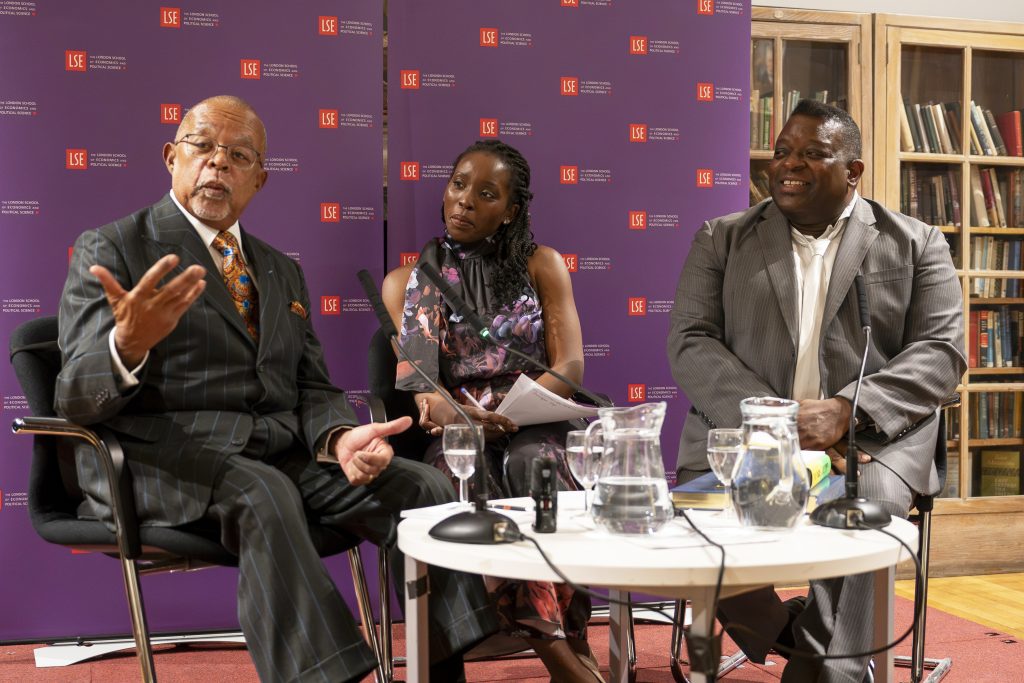
Watch or listen to the full version of Professor Henry Louis Gates, Jr in conversation with Sir Isaac Julien in “Recovering enslaved peoples’ perspectives from archives, literature, and art“, chaired by Dr Imaobong Umoren and hosted by the Phelan US Centre at LSE on 5 October 2023:
References
Matera, Marc. 2015. Black London: The Imperial Metropolis and Decolonization in the Twentieth Century. Oakland, California: University of California Press


